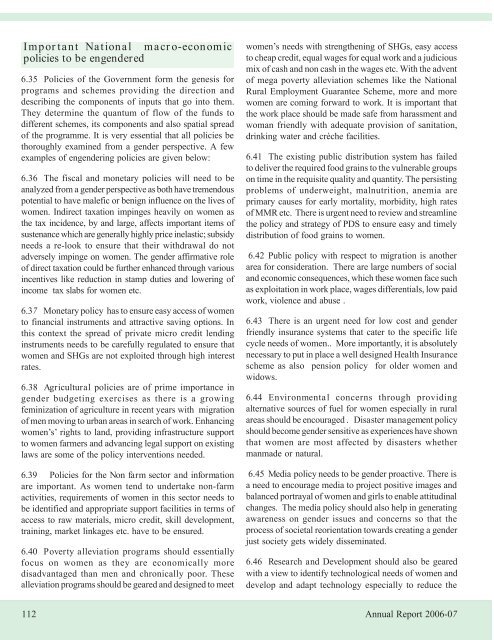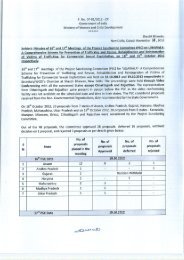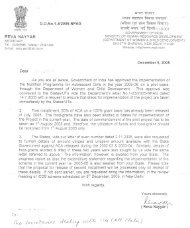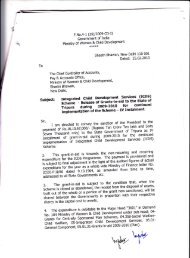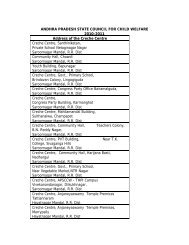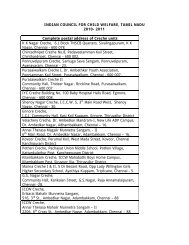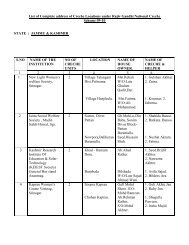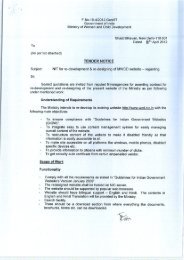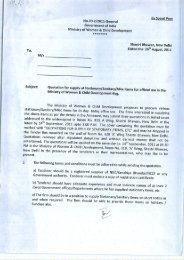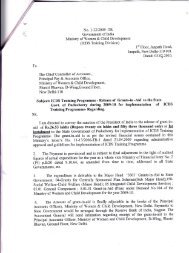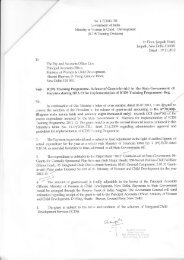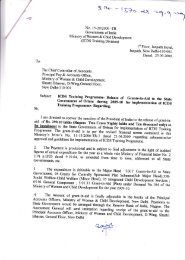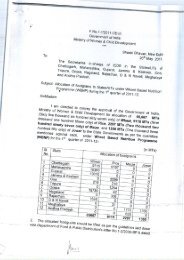COVER HINDI - Ministry of Women and Child Development
COVER HINDI - Ministry of Women and Child Development
COVER HINDI - Ministry of Women and Child Development
- TAGS
- hindi
- ministry
- wcd.nic.in
You also want an ePaper? Increase the reach of your titles
YUMPU automatically turns print PDFs into web optimized ePapers that Google loves.
Important National macro-economic<br />
policies to be engendered<br />
6.35 Policies <strong>of</strong> the Government form the genesis for<br />
programs <strong>and</strong> schemes providing the direction <strong>and</strong><br />
describing the components <strong>of</strong> inputs that go into them.<br />
They determine the quantum <strong>of</strong> flow <strong>of</strong> the funds to<br />
different schemes, its components <strong>and</strong> also spatial spread<br />
<strong>of</strong> the programme. It is very essential that all policies be<br />
thoroughly examined from a gender perspective. A few<br />
examples <strong>of</strong> engendering policies are given below:<br />
6.36 The fiscal <strong>and</strong> monetary policies will need to be<br />
analyzed from a gender perspective as both have tremendous<br />
potential to have malefic or benign influence on the lives <strong>of</strong><br />
women. Indirect taxation impinges heavily on women as<br />
the tax incidence, by <strong>and</strong> large, affects important items <strong>of</strong><br />
sustenance which are generally highly price inelastic; subsidy<br />
needs a re-look to ensure that their withdrawal do not<br />
adversely impinge on women. The gender affirmative role<br />
<strong>of</strong> direct taxation could be further enhanced through various<br />
incentives like reduction in stamp duties <strong>and</strong> lowering <strong>of</strong><br />
income tax slabs for women etc.<br />
6.37 Monetary policy has to ensure easy access <strong>of</strong> women<br />
to financial instruments <strong>and</strong> attractive saving options. In<br />
this context the spread <strong>of</strong> private micro credit lending<br />
instruments needs to be carefully regulated to ensure that<br />
women <strong>and</strong> SHGs are not exploited through high interest<br />
rates.<br />
6.38 Agricultural policies are <strong>of</strong> prime importance in<br />
gender budgeting exercises as there is a growing<br />
feminization <strong>of</strong> agriculture in recent years with migration<br />
<strong>of</strong> men moving to urban areas in search <strong>of</strong> work. Enhancing<br />
women’s’ rights to l<strong>and</strong>, providing infrastructure support<br />
to women farmers <strong>and</strong> advancing legal support on existing<br />
laws are some <strong>of</strong> the policy interventions needed.<br />
6.39 Policies for the Non farm sector <strong>and</strong> information<br />
are important. As women tend to undertake non-farm<br />
activities, requirements <strong>of</strong> women in this sector needs to<br />
be identified <strong>and</strong> appropriate support facilities in terms <strong>of</strong><br />
access to raw materials, micro credit, skill development,<br />
training, market linkages etc. have to be ensured.<br />
6.40 Poverty alleviation programs should essentially<br />
focus on women as they are economically more<br />
disadvantaged than men <strong>and</strong> chronically poor. These<br />
alleviation programs should be geared <strong>and</strong> designed to meet<br />
women’s needs with strengthening <strong>of</strong> SHGs, easy access<br />
to cheap credit, equal wages for equal work <strong>and</strong> a judicious<br />
mix <strong>of</strong> cash <strong>and</strong> non cash in the wages etc. With the advent<br />
<strong>of</strong> mega poverty alleviation schemes like the National<br />
Rural Employment Guarantee Scheme, more <strong>and</strong> more<br />
women are coming forward to work. It is important that<br />
the work place should be made safe from harassment <strong>and</strong><br />
woman friendly with adequate provision <strong>of</strong> sanitation,<br />
drinking water <strong>and</strong> crèche facilities.<br />
6.41 The existing public distribution system has failed<br />
to deliver the required food grains to the vulnerable groups<br />
on time in the requisite quality <strong>and</strong> quantity. The persisting<br />
problems <strong>of</strong> underweight, malnutrition, anemia are<br />
primary causes for early mortality, morbidity, high rates<br />
<strong>of</strong> MMR etc. There is urgent need to review <strong>and</strong> streamline<br />
the policy <strong>and</strong> strategy <strong>of</strong> PDS to ensure easy <strong>and</strong> timely<br />
distribution <strong>of</strong> food grains to women.<br />
6.42 Public policy with respect to migration is another<br />
area for consideration. There are large numbers <strong>of</strong> social<br />
<strong>and</strong> economic consequences, which these women face such<br />
as exploitation in work place, wages differentials, low paid<br />
work, violence <strong>and</strong> abuse .<br />
6.43 There is an urgent need for low cost <strong>and</strong> gender<br />
friendly insurance systems that cater to the specific life<br />
cycle needs <strong>of</strong> women.. More importantly, it is absolutely<br />
necessary to put in place a well designed Health Insurance<br />
scheme as also pension policy for older women <strong>and</strong><br />
widows.<br />
6.44 Environmental concerns through providing<br />
alternative sources <strong>of</strong> fuel for women especially in rural<br />
areas should be encouraged . Disaster management policy<br />
should become gender sensitive as experiences have shown<br />
that women are most affected by disasters whether<br />
manmade or natural.<br />
6.45 Media policy needs to be gender proactive. There is<br />
a need to encourage media to project positive images <strong>and</strong><br />
balanced portrayal <strong>of</strong> women <strong>and</strong> girls to enable attitudinal<br />
changes. The media policy should also help in generating<br />
awareness on gender issues <strong>and</strong> concerns so that the<br />
process <strong>of</strong> societal reorientation towards creating a gender<br />
just society gets widely disseminated.<br />
6.46 Research <strong>and</strong> <strong>Development</strong> should also be geared<br />
with a view to identify technological needs <strong>of</strong> women <strong>and</strong><br />
develop <strong>and</strong> adapt technology especially to reduce the<br />
112 Annual Report 2006-07


